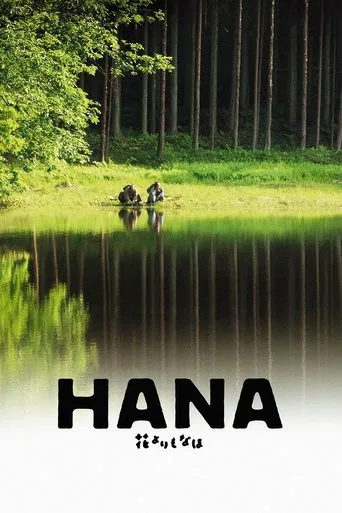

Stylish but barely mediocre overall
... View MoreYour blood may run cold, but you now find yourself pinioned to the story.
... View MoreIt's an amazing and heartbreaking story.
... View MoreThis is a must-see and one of the best documentaries - and films - of this year.
... View MoreWith its caste of row-house poor, HANA reminds one in many ways of Akira Kurosawa's classic, DODESKADEN (Mago, in particular, who brings to mind the young "star" of Kurosawa's movie). Samurai Soza's lack of pretension certainly sets him apart from most of the samurai we see in most samurai movies: he gives it the old bushido try, but, soundly trounced in front of the other row-house denizens, he doesn't suck it up and work toward avenging the insult (nor, ultimately, does he follow through on his avowed mission to avenge his father's death at the hands of another samurai). At first we see him ostensibly looking for a reason to kill; by film's end, he's looking for a reason to live. The final shot of the movie sums it all up so beautifully (and simply). If you're interested in flawless filmmaking, here it is: HANA never misses a beat.
... View MoreThis film was produced by Shochiku, a studio that I'm told is renowned for it's middle-of-the-road part-comedy/part-pathos films. Hana fits squarely in that territory and is Kore-eda's most commercial film to date.Set in the slums of 1702 Edo (now Tokyo), the cinematography and attention to period detail were excellent. The story itself is fairly lame. A young samurai, incompetent with a sword seeks revenge for his father's death, but finds himself unable to carry out the act.There's no doubting the competence of the director and the film's visuals are a joy to behold. It's not something that particularly engages me, but is the sort of film I would love to take my six year old son to. The blend of humour and almost slapstick action would certainly be enjoyed by him. Mind you, this is not really a children's film, even though it has the appeal of a Japanese version of a Disney film. Many adults would enjoy it, but it's not my thing.
... View MoreI think the first reviewer misses the point of Kore-Eda's work. He has an almost documentarian's way of showing human behavior. It's decidedly not theatrical. His characters are flawed, real people. Soza-sensei's abhorrence of violence is not undercut by his fear of being sliced up. He discovers the strength to be a real human being amid what he comes to recognize as counterproductive posturing.The 47 Ronin subplot is not a distraction. It's a mirror of Soza's choosing life over revenge. Susumu Terajima hits just the right note as the surviving Ronin. If you don't know Japanese history and myth-making, it might seem like a distraction, but it is the point of the whole story, that a slavish devotion to the ideals of Bushido is in conflict with living an authentically human life.Besides, Rie Miyazawa is a total hoot in the play within a play. It is a pleasant surprise that Kore-Eda can do comedy and still keep it real. I was beginning to think that he was only good at grimness, but I was reminded of the small comic touches in "Nobody Knows" and "Afterlife." I can't remember if there was anything funny in "Mabarosi." I just remember how depressing it was.
... View MoreHana Yori mo Naho is a Samurai film in which there are no flashing swords or bodies leaping over walls. Hirokazu Koreeda's (Maborosi, After Life) latest is a gentle comedy-drama that deconstructs the legend of the brave Samurai warrior and the Bushido code of seeking honor through revenge. The title of the film means flower, and Hana wants to change the symbol of the cherry blossom associated with the warrior spirit to one that represents a peaceful and nurturing life. Engendered by the earthy humor of the underclass, the film has many laughs, a wonderful soundtrack of joyous Renaissance music, and colorful characters brought to life by an excellent ensemble cast, yet it meanders and lacks a single crystallizing moment that brings its point home.Set in Edo (modern day Tokyo), Hana takes us back to the year 1702 where Soza (Okada Junichi), a young Samurai has come to the village to fulfill his father's dying wish and seek revenge against his killer, Jubei Kanazawa (Tadanobu Asano). Illuminating the conditions of the times, Soza lives in a dilapidated building that he shares with other impoverished residents: garbage collectors, fish peddlers, and debtors hiding out from collectors. Though he wants to restore honor to his family and collect the 100 Ryo reward from his clan to help his impoverished family, Soza lacks even the basic skills of a swordsman.This becomes painfully evident when he is roughed up by Sodekichi (Ryo Kase), a local resident who resents the Samurai. A friend, Sadoshiro (Arata Furuta) also exploits the trusting Soza, claiming many times in restaurants that he has seen Kanazawa in order to have Soza buy his food. While seeking the man who killed his father, Soza establishes himself in the community, teaching the boys and girls in the village to read and write and finding much in common with Osae (Rie Miyazawa), a married woman who, with her eight-year old son, is waiting for husband to return. A satirical subplot questioning the legend of the 47 Ronin and the warrior spirit the story represents, complicates things as a group of samurai on their own mission of revenge, hide in the town disguised as professional people.They distrust Soza, thinking that he is a spy and assign a fellow ronin to watch his every move. When the young Samurai finally crosses paths with his father's attacker, now a family man living with a widow and her child, he questions the Samurai code of honor and the ethics of revenge. Soza, sensitively portrayed by Okada - a band singer turned actor, is a good-hearted man who recognizes the need to better his society, yet Koreeda portrays him as a weakling and a coward, a role that undermines the film's anti-violence message. While Koreeda is to be congratulated for attempting a major stylistic departure and for condemning the endless cycle of violence, Hana falls short of his best efforts.
... View More